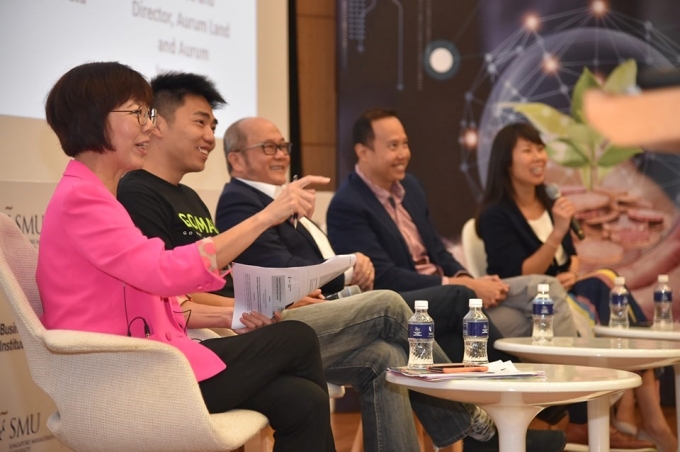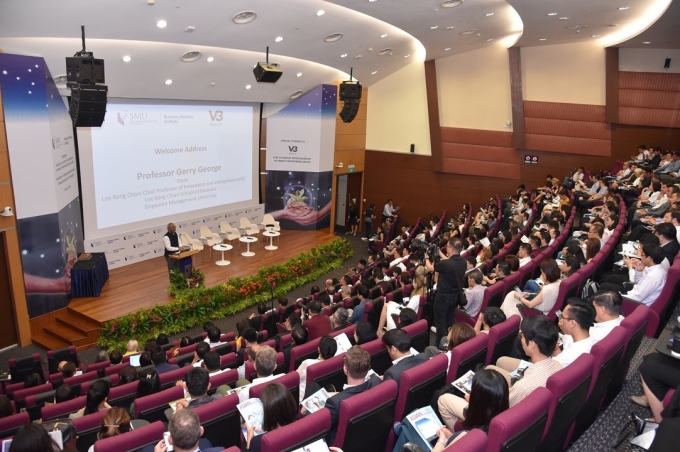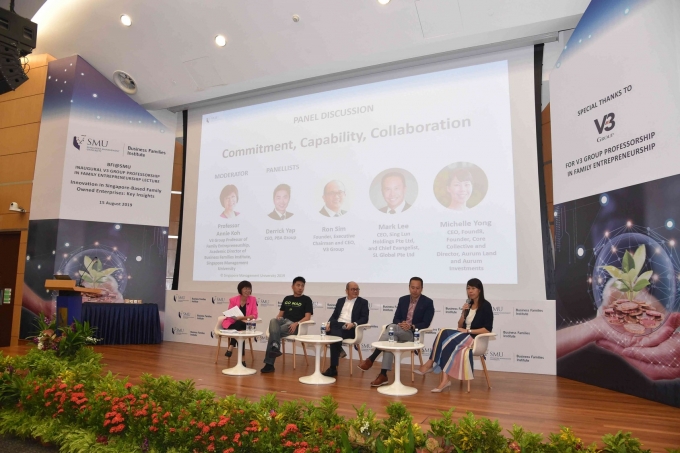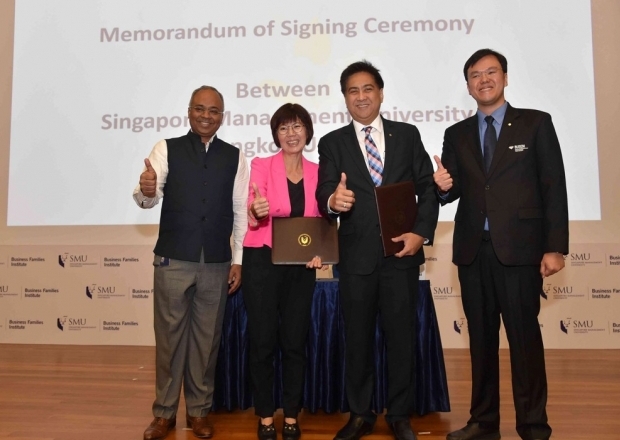
Business Families Institute (BFI) which is Southeast Asia’s first regional institute focusing on family businesses marked another milestone on 15th August 2019, at the inaugural V3 Group Professorship in Family Entrepreneurship Lecture. Professor Annie Koh, who has been named the first V3 Group Professor of Family Entrepreneurship, presented key insights from BFI’s latest research survey on innovation based on 86 Singapore-based family firms across a range of sectors, including food & beverage, manufacturing, wholesale and retail trade, healthcare, hospitality, real estate and financial services.

The event held at the Mochtar Riady Auditorium was attended by over 250 participants from business family’s entrepreneurs, industry professionals and practitioners academia as well as SMU students and staff. The Lecture was preceded by a Welcome Address by Professor Gerry George, Dean and Lee Kong Chian Chair Professor of Innovation and Entrepreneurship, SMU Lee Kong Chair School of Business. He emphasised on the importance of innovative approaches to address sustainable development goals. Professor George congratulated Professor Annie Koh on being named the inaugural V3 Group Professor of Family Entrepreneurship and thanked Mr Ron Sim, the Founder, Executive Chairman, CEO of V3 group for his generous endowed gift and continued partnership with SMU.

The audience was also treated to a lively discussion when an esteemed panel of successful family entrepreneurs joined Mr Ron Sim for a discussion on how families can be entrepreneurial, and how being entrepreneurial creates opportunities for innovation.
Key Highlights from the Lecture and Panel Discussion:
1. 3Cs of Innovation for family firms
The survey results made an important conclusion that innovation is the key to business sustainability and highlighted the 3Cs of innovation – Commitment, Capability and Collaboration. For innovation to be successful, it needs commitment from all levels of organisation and should not be a top-down approach. Professor Koh highlighted that even though the most popular forms of innovation as per the survey are product/service and process innovation, the most powerful form of innovation is the organisational innovation which includes the redesign of the business model.
The second ‘C’ refers to capability which means the interplay of internal and external catalysts to drive innovation. Family vision, industry knowledge, company culture and talent are the key internal drivers to successful innovation. However, innovation cannot happen in isolation. Financial assistance from government, other external funding partners and education/ R&D partners are needed to support innovation.
Last but not the least, the 3rd C stands for collaboration. Entrepreneurs need the right strategic partnerships for their expansion plans. Professor Koh emphasised on the 3Ts of collaboration - Trust, Tech and Talent.
2. Important findings from the survey based study
The descriptive statistics obtained from the survey results revealed that:
- 83% of the respondents found it challenging to grow and scale their businesses due to the limited size of Singapore’s domestic market, and 74% viewed innovation as a key strategy to stay ahead of the competition.
- 40% of the respondents felt that product innovation and service innovation were most important to their businesses, followed by process innovation (29%) and organisational innovation (27%).
- Among the companies surveyed, those who tapped on external financing to support their innovation utilised bank loans (67%), followed by angel investors (15%) and crowdfunding (5%).
- Over 60% of the respondents felt that regardless of the availability of government financial grants, their firms will still proceed with innovation initiatives.
- The majority of respondents had not collaborated with education institutions (56%) nor government institutions (62%) to develop innovation initiatives.
3. Journey of Innovation
Mr Ron Sim who has over 40 years of entrepreneurship experience opined that the three key factors in the process innovation are ownership, imagination and execution. He emphasised that the innovation has to come from every level in an organisation. The discussion was taken further by Mr Mark Lee, CEO, Sing Lun Holdings Pte Ltd, and Chief Evangelist of SL Global Pte Ltd, who said “in order to survive, businesses need to constantly innovate by first finding benchmarks in their own industry, then finding benchmarks in other industry and from there finding technologies that can disrupt your own industry”.
4. Stages of Innovation
Mr Sim mentioned that there are three stages of Innovation. Early-stage innovation, middle-stage and mature-stage innovation. Taking the discussion further, Ms Michelle Yong, Chief Executive Officer of Found8, Founder of Core Collective and Director of Aurum Land and Aurum Investments said, “Aurum's strategy for innovation is to constantly scan the horizon for new market trends to identify opportunities which are synergistic with our existing businesses and core competencies, and aligned with our purpose to build supportive environments that create change, accelerate growth and advance communities. We believe in leveraging the more mature businesses to incubate, provide knowledge, expertise and resources to accelerate product innovation and optimisation of new businesses”.
5. Approaches to Innovation
Entrepreneurs may approach innovation in different ways. Mr Derrick Yap, CEO, PBA Group, in his efforts to transform PBA into a regional powerhouse in robotics and automation, adopted a sandbox approach. He began his entrepreneurial journey in the company’s Malaysian market with only a six-men team. The process of innovation takes time, which is also consistent with the survey results that for innovation to be fruitful there is a time lag of 1-3 years. While sharing his experiences Derrick said candidly, “my father allowed me to fail and tied my remuneration to the performance of the business. He asked the accountant to constantly monitor my performance”. He explained how this approach helped him to be resourceful and find ways to cut costs. He was challenged to not only make the business profitable but also sustainable for future generations. Another approach to innovation is one of a launch-pad concept that came from Michelle, who would explore new growth areas beyond the core family business of construction.
The lecture prompted a lively discussion, which continued in the reception that followed. The event ended with announcement of a new research partnership between BFI and Bangkok University which was inked via a Memorandum of Understanding signed by Professor Koh and Assistant Professor Dr Veerapong Malai (Vice President for Innovation and Creative Entrepreneurship Development, Bangkok University). Under the agreement, both parties will take this research forward by incorporating Thailand-based family owned enterprises in the innovation survey as well.

Testimonials
“This is one of the many events that SMU@BFI organised with great success. In fact, we are one of the companies which was surveyed and the statistic showed that we are not the only one facing the same problems. Information presented by Professor Annie Koh was very useful and is something that I have to relook into our digitisation processes. Great job BFI team. Look forward to many more such fruitful events” Toh Yee Sian, Business Development, Kheng Sun Hiring Equipments Pte Ltd.
“The event was great for gaining insights into innovation in Singapore family business enterprises. Interesting research findings, and a significant opportunity to network with exceptional people.” Dr Suchart Tripopsakul, Assistant Professor, School of Entrepreneurship and Management, Bangkok University.
“The lecture provided us this many useful insights and actionable steps to better foster innovation in family firms.” Peh Zhengyang, Director, D’Elegance International Pte Ltd.